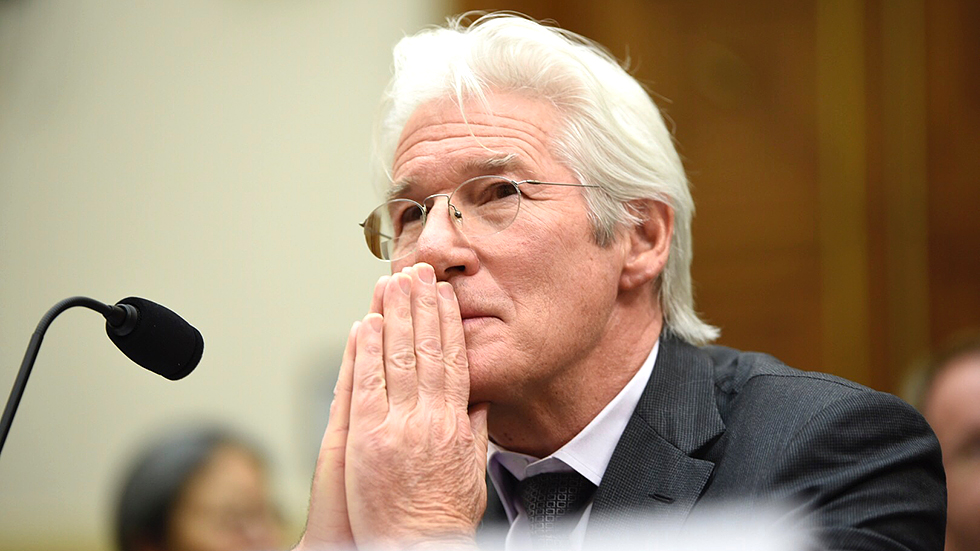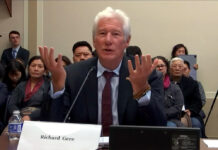
(TibetanReview.net, Dec08, 2017) – Hollywood star and Tibet activist Richard Gere has said Dec 6 that he was “knocked out” by the support and proposals from US lawmakers during a nearly two-hour long Congressional hearing on US Tibet policy in Washington, DC. Gere, Chair of Washington-based International Campaign for Tibet (ICT), testified at the hearing, which was hosted by the Subcommittee on Asia and the Pacific.
At the hearing, members of the Subcommittee and the witnesses who gave testimony called for substantive action to resolve the Tibet issue in the context of a wide-ranging debate covering China’s place in the world, the Dalai Lama and his succession issue, the strategic importance of Tibet to the PRC, and other issues, said ICT Dec 6.
ICT said the Subcommittee hearing came amid efforts to advance the bipartisan Reciprocal Access to Tibet Act and a Concurrent Resolution in support of Tibet’s place in American foreign policy. Mr Tenzin Tethong, Director of the Tibetan Service of Radio Free Asia, and Carl Gershman, President of the National Endowment for Democracy (NED), were also stated to have testified.
Subcommittee Chairman Ted Yoho was stated to have opened the hearing with a statement that raised both the Reciprocal Access to Tibet Act (H.R.1872 in the House, S.821 in the Senate) and the Concurrent Resolutions on Tibet (H.Con.Res.89 in the House, S.Con.Res.30 in the Senate).
“Human rights and personal freedoms in Tibet are already in a poor and worsening state. According to the State Department’s 2016 human rights report, the government of China engages in the severe repression of Tibet’s unique religious, cultural, and linguistic heritage by among other means, strictly curtailing the civil rights of the Tibetan population,” Yoho was quoted as saying.
Ranking Member Brad Sherman was stated to have spoken on China’s intensified repression in Tibet over the last decade. Rep. Jim McGovern, who introduced the Reciprocal Access to Tibet Act earlier this year alongside Rep. Randy Hultgren, was also given time to address the Subcommittee. He has concluded by saying Tibet supporters must “move beyond words to concrete actions”.
Rep. Ileana Ros-Lehtinen was stated to have spoken of being “increasingly worried that Tibet has been pushed to the periphery of US foreign policy”. She has demanded that Americans “must stand strong in our commitment to the people of Tibet”.
Other Subcommittee members who were present or gave remarks were stated to included Representatives Scott Perry; Gerald Connolly, who first visited Tibet in the late 1980s; Tulsi Gabbard; and Alice Titus.
Representative Perry was stated to have raised the possibility of the US recognizing the Tibetan Government-in-Exile as a way to send a strong message to China to resolve the Tibetan issue.
Gere was stated to have contrasted the deepening levels of repression implemented by Chinese authorities with the Tibetans’ efforts in a “path towards coexistence, and away from conflict”. Supporting Tibetans’ call for genuine autonomy, he has said China’s accountability on conforming to international law must grow as the country takes a larger role on the world stage.
In his testimony, Tenzin Tethong was quoted as saying, “On any given day, people in Tibet may wake up without access to the Internet and unable to make a phone call because authorities have shut down all communications. And entire families may be taken into custody under suspicion that one individual, or a close relative, has communicated with foreign media or NGOs.”
Carl Gershman has listed recommendations on how the American government could better spotlight Tibet in discussions with the People’s Republic of China, warning of the threat posed by China to the world order. Citing a new NED report, he has described China’s rising authoritarian influence as “sharp power” rather than “soft power”, given the fact that “its goal is to pierce and penetrate targeted populations by manipulating and distorting the information that reaches them.”





